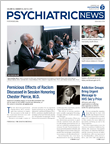A forensic assertive community treatment (FACT) program known as the Rochester model successfully reduces jail and hospital use among patients with serious mental illness and a history of criminal behavior, reports a study published June 1 in Psychiatric Services in Advance.
The Rochester FACT model is not the first attempt to adapt ACT to serve patients who are involved with the criminal justice system, said J. Steven Lamberti, M.D., a professor of psychiatry at the University of Rochester Medical Center and co-developer of this program.
“But what makes our model different is that it’s a true partnership that merges mental health and criminal justice components.”
Lamberti told Psychiatric News that other FACT efforts have been more peripheral collaborations between these two components. For example, the programs may just involve a traditional ACT team that shuttles patients to mental health courts. As such, existing research on FACT programs has produced mixed results, with some studies even showing that FACT can increase criminal recidivism.
The Rochester model includes some key components that depart from traditional ACT paradigms. For one, Rochester FACT teams are well-versed in the criminal justice system by design, rather than default. Second, the teams identify and address drivers of crime—such as substance use, social support for crime, and unemployment—not just the drivers of mental illness when developing treatment plans for their patients.
Perhaps most critical to the program is that each FACT team partners with a criminal judge to oversee the patients. By integrating with the justice system, Rochester FACT teams have more “legal leverage” to increase patient engagement or develop creative solutions, Lamberti said.
As an example, Lamberti referenced a patient who was having trouble complying with regular therapy visits. The FACT team identified that the patient wanted to lose weight, so the team worked with the judge to focus on physical health first as part of their probation, which helped get the patient more involved in recovery.
For the Psychiatric Services study, meant to prove the feasibility of the Rochester FACT model on a larger scale, 70 adults with psychotic disorders who had been recently arrested for a misdemeanor crime (and eligible for a conditional discharge) were enrolled and randomly assigned to receive regular visits from a Rochester FACT team or enhanced treatment as usual (TAU) for one year.
As Lamberti explained to Psychiatric News, people in the criminal justice system are considered a vulnerable population from a human subject perspective. This means that clinical studies have to include additional safeguards, such as ensuring quality interventions even for the control arms. So, the enhanced TAU participants still received benefits like immediate access to care and enrollment in Strong Ties, a specialty clinic with an integrated care program.
“It was a very good control group, which made us nervous experimentally,” Lamberti said.
After one year, though, the FACT participants still had better outcomes in several measures.
There were no differences between groups in the number of arrests or incarcerations, which Lamberti attributed to judges issuing bench warrants to arrest FACT participants who missed an appointment and give them brief jail time as an encouragement not to miss future sessions. So, while both groups had similar numbers, the FACT group was committing fewer new crimes.
Supporting this, the average time spent in jail was around 21.5 days for FACT compared with 43.5 days in the TAU group, while the average number of convictions was 0.4 compared with 0.9. FACT participants also spent fewer average days in inpatient hospitalization and more days in outpatient mental health services.
Lamberti said that these results are very encouraging, but acknowledged that the current study looked only at service utilization. “The patients enrolled in FACT are spending less time in jail and more time in clinics, but are they getting better? From their standpoint, that is the important endpoint, and we hope to look at those outcomes next,” he said.
“In the meantime, we hope that this paper will spark further research, not only here in Rochester but with ACT programs across the country.”
This study was supported by a grant from the National Institute of Mental Health. ■
“A Randomized Controlled Trial of the Rochester Forensic Assertive Community Treatment Model” can be accessed
here.

